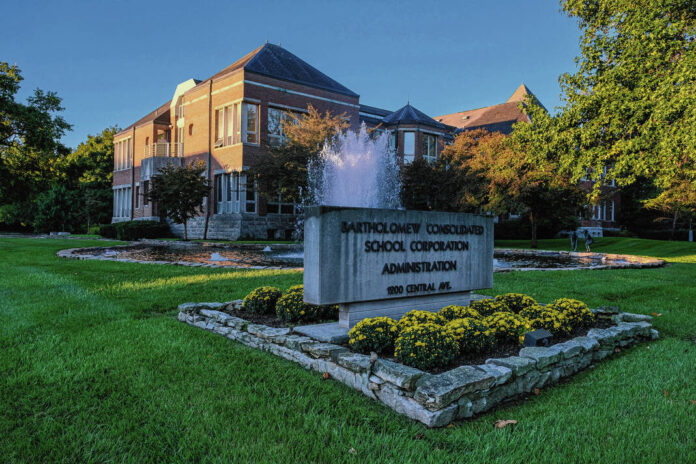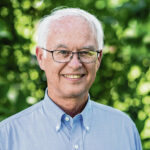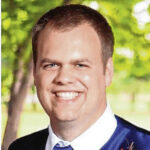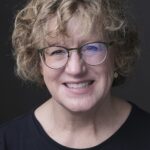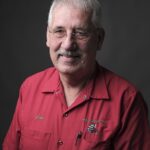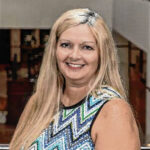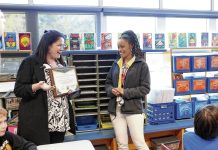COLUMBUS, Ind. — Political agendas, referendum renewal and post-pandemic academic recovery were among the issues discussed by Bartholomew Consolidated School Corp. school board candidates at Thursday’s virtual town hall.
The Columbus Educators Association (CEA) and the Bartholomew County Retired Teachers Association (BARTA) co-hosted a virtual forum featuring District 4 and 6 candidates. The session was held over Zoom, and organizers said a recording will be uploaded to YouTube by the end of the week.
Members of the public were able to submit questions prior to the event, with a team of current and retired teachers reviewing the submissions and selecting the final questions for the event. Some of the questions were the same as those posed to District 1 and 2 candidates at Tuesday’s forum; others differed.
Each candidate was given one minute to answer each question, as well as the opportunity to give opening and closing statements.
Dale Nowlin and Eric Grow are running for the District 4 seat. Incumbent Kathy Dayhoff-Dwyer, who represents District 6, is running for re-election, with newcomers Cheryl K. Miles-Vieth, Logan K. Schulz and Mark Douglas also seeking the seat.
Grow
Schulz
Kathy Dayhoff-Dwyer
Douglas was the only candidate from the two districts who was not present at the forum. Organizers said he had declined to participate.
BARTA moderator Janice Montgomery noted, in one question, that both Republicans and Democrats have shown a “renewed interest in public education.” At the national level, individuals of both parties have shared a variety of opinions on the subject, and at the state level, a bill was proposed that would have made school board races partisan.
“In this era of ever-worsening political polarization, which political agendas do you see targeting our schools and how would you keep them out of our schools?” Montgomery asked.
According to Nowlin, the “key to finding common ground” is to focus on putting students first.
Nowlin previously served two terms on the National Assessment Governing Board, which is set by Congress and “oversees the nation’s report card.” He was one of three teachers on the board, and there were a number of politicians there as well.
“We had a common vision, and that was to learn how to — learn what students know and can do and how to measure that,” said Nowlin. “And we had disagreements, we had discussions, but it never became political because we kept looking at the vision of ‘What can we do for the kids in terms of assessment?’ And I see this the same way. I would be glad to go up to Indianapolis and fight for kids, but it would be a matter of fighting for what’s best for all kids.”
Other candidates echoed Nowlin’s sentiment of students first, including his opponent. Grow also said that a lot of politics are being put into public education, which is unfortunate but “inevitable.”
“There are specific things around teachers’ union contracts, content in our libraries, which is a topic that I’ve been vocal about,” he said. “So there’s a space for them, for sure, but at the end of the day, we all have to have the mentality that this is about our kids first.”
Grow has criticized what he labels as explicit material in school libraries during the time for public comment at school board meetings.
Miles-Vieth said she sees book banning as an issue that has targeted schools.
“All of us are very passionate about our children because we love them and we want to guide them in the best path possible,” she said. “My concern about book banning is that one person’s idea of what’s bad may not be the same for someone else, so then what we’re going to do is restrict that access to everyone.”
Parents who are concerned could instead call their school’s library directly and ask that their child not be allowed to check out certain books, she said.
She added that while critical race theory is something of a moot point, as it isn’t taught in schools, school officials need to think about what’s best for kids so that they can “expand their minds and become critical thinkers and also become respectful of one another’s different opinions.”
Providing safe spaces for learning and critical thinking outside of “traditional partisan lanes” is important, said Schulz. He said that while politics shouldn’t have a place in schools, it does play into funding. BCSC officials should work with legislators to ensure that teachers are not demonized and receive proper funding, he said.
Schulz added that he’s worked on Department of Child Services reform in the past and co-founded Champions for Children. The group desscribes itself as a grassroots organization in Indiana with the purpose of “educating citizens about child-welfare related bills, lobbying legislators, educating on DCS policy, and helping guardians better understand how they can legally advocate for the children in their care.”
Dayhoff-Dwyer said politics should “stay out of our school system.” Additionally, kids should be able to make up their own minds, become leaders and know both sides. She also said that parents should share their own views with their children and start a dialogue on the subject.
Another topic of note was BCSC’s 2020 referendum, which asked voters if they would be willing for the school corporation to impose an additional property tax rate not exceeding $0.1560 on each $100 of assessed value “for the purpose of increasing compensation for teachers and support staff and maintaining student safety.” The referendum passed with 61.33% of the votes and lasts for a total of eight years.
Montgomery noted the referendum will eventually need to be reauthorized, and board members will have to decide whether or not to put it on the ballot again. She asked if candidates had supported the initial referendum and if they would support a renewal.
Nowlin, a former BCSC teacher and occasional substitute, said that he fully supported the 2020 referendum. While he would hope that the state would provide enough funding for a renewal to be unnecessary, if that doesn’t happen he would support another referendum as a good way to determine public support. He believes last referendum was successful because of its focus on teacher and staff salaries.
Grow said, “If I were elected to the board, and we ended up in a position where we had to go ask our already overtaxed taxpayers to pay more taxes for something as important as giving our teachers a raise, I would just feel like I’d failed miserably.”
It’s important to prioritize teachers when budgeting, he said. If the school corporation were to pose another referendum, it should be on things that are of a lower priority, Grow said.
Schulz said he supported the 2020 referendum but wouldn’t go to that well first. Instead, he would look at the budget and other opportunities such as grants, advocating for state funding, and corporate investments. If these are not enough, he would then move forward with a referendum.
Dayhoff-Dwyer, the only incumbent board member at Thursday’s forum, said, “Absolutely I supported the referendum before, because it’s not my money. It’s the community’s money. It’s the taxpayer money, and only they know what they can afford and what they can’t afford.”
She acknowledged that while the increase may have been a hardship for some families, state funding regulations pose certain budgeting challenges for BCSC.
“Our hands are a little bit tied, but that’s not to say that we can’t work with it,” said Dayhoff-Dwyer. “And yes, I would support the referendum again.”
Miles-Vieth — who, like Nowlin, is a retired BCSC teacher — said she supported the last referendum and assumes that if another were being considered, it would only be out of necessity.
She added that the nationwide teacher shortage is “not going away soon.” Therefore, if BCSC wants to attract the best applicants, they need to have the funds to pay them, she said.
Another question, as read by Central Middle School teacher and CEA moderator Alan Birkemeier, stated that according to data from the Centers for Disease Control and Prevention, “existing inequalities in education were exacerbated during the pandemic.” This has resulted in larger achievement gaps between different student groups as categorized by race, gender and sexuality, and whether or not English is their first language.
“What do you think BCSC should do to minimize the performance gap that grew between the different populations of students during the pandemic?” Birkemeier asked.
Dayhoff-Dwyer replied that there needs to be a return to the basics and added that recovery may take some time. However, with students being back in the classroom around their peers and teachers, she hopes that things will “turn around” in the next year or so.
Smaller classes, one-on-one tutoring and small group instruction were solutions suggested by Miles-Vieth. She added that the school corporation should work with the community to help meet students’ needs outside of school, such as mental health, poverty and food insecurity.
Schulz said that going back to basics is important, and students “do their best when they feel both secure and heard.”
There needs to be targeted investment into classrooms, he added. Teachers need to have the opportunity to work with individual students while also taking care of the whole class, and hiring and retention are also important.
“During this campaign, I’ve had concerning discussions with teachers around piling administration-wide initiatives, de-professionalizing the profession and increasing financial stress,” said Schulz. “Where we invest our budget illustrates the priority — and to reduce education gaps at an individual level, that needs to be the teachers.”
Grow said that schools need to stop “marginalizing” and focus on kids as “unique individuals.” He added that parent and community involvement are necessary for success.
“We need to bring back the idea of the public square, where we can bring all of our competing ideas to a place and come up with our best ideas and implement those,” he said. “And then I think we need to have the conversation about how much we’re pointing our finger at COVID as the cause and address how much of it is just the — is the stressor that revealed the cause.”
Nowlin noted that BCSC has done good work with using COVID relief funds to hire more teachers and reduce class sizes. He also commended their work with Counseling Counts. However, he added that he would have liked to see a curriculum day for teachers, prior to the start of classes, where they could discuss students’ needs and progress, then adjust curriculum as needed.
He also said that Universal Design for Learning and Social Emotional Learning are also helpful tools for addressing achievement gaps.
In addition to the topics mentioned above, candidates also answered questions regarding how they would respond to unexpected and unknown challenges, their feelings on school corporation curriculum and programming, and how they would balance different perspectives from the community, including those that conflict with their own opinions.

